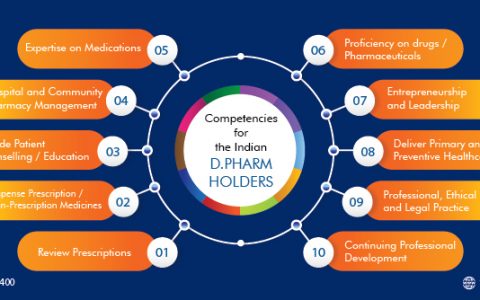
Join Best College In Ranchi To Make an Aspiring Career in Nursing
July 10, 2023
Learn All about Data Science; Join PG Diploma in Data Science at UMU
July 19, 2023Pharmacy is a profession that holds significant importance and offers numerous opportunities for individuals seeking a rewarding career. This career scope in Pharmacy contributes to a stable job market and provides pharmacists with a higher level of job security compared to other professions.
About B. Pharm Programme
B.Pharm is a degree programs for undergraduates for family education. Under this course the learner has diverse opportunities to learn about medicines and their therapeutic effect on the human body. It is a B.Pharm four year degree program where the learner learns about synthesis of drugs their uses of dosages on human body depending upon the symptoms exhibited along with chemical instrumentations and their preclinical analysis and their effect on human body.
About D. Pharm Programme
Diploma in Pharmacy (D.Pharma Course) is one of the most demanded diploma programmes for science background students. In this 2 years of program course the learner gains wide knowledge about medicines and its dispense. The course program gives a rewarding career to the students by giving them wide job opportunities in various field.
Table of Contents:
- Significance of Pharmacy as a career option
- Points to know while choosing Pharmacy as a career option
Significance of Pharmacy as a career option
-
Healthcare Contribution:
Pharmacists play a crucial role in healthcare by ensuring the safe and effective use of medications. Admission in B.Pharma/ D.Pharma courses from Usha Martin University provides valuable expertise in drug interactions, dosage regimens, and potential side effects to both patients and other healthcare professionals.
-
Patient Care:
Pharmacists are accessible healthcare professionals who directly interact with patients. They offer counseling on medication usage, answer questions, and provide guidance on managing chronic conditions. Pharmacists can positively impact patients’ health outcomes through medication management and adherence.
-
Diverse Career Paths:
Pharmacy offers a wide range of career paths, allowing individuals to choose from various sectors such as community pharmacy, hospital pharmacy, industry, research, academia, regulatory bodies, and more. This diversity allows pharmacists to explore different areas of interest and find a niche that aligns with their professional goals.
-
Job Prospects and Stability:
The demand for pharmacists remains strong, driven by an aging population, expanding healthcare services, and advancements in medication therapies.
-
Opportunities for Advancement:
Pharmacists can pursue advanced degrees (e.g., Pharm.D., Ph.D.) or specialized training to expand their knowledge and skill set. This opens up opportunities for career advancement, such as clinical pharmacy roles, research positions, management positions, or entrepreneurship within the pharmaceutical industry.
-
Influence on Public Health:
Pharmacists contribute to public health initiatives, such as immunization programs and medication therapy management. They also play a vital role during public health emergencies, offering guidance on medications and participating in disaster response efforts.
-
Salary and Benefits:
Pharmacy careers often come with competitive salaries and comprehensive benefits packages. While salaries may vary based on factors like experience, specialization, and geographic location, pharmacists generally enjoy financial stability and attractive compensation.
-
Professional Fulfillment:
Pharmacy allows individuals to make a meaningful impact on people’s lives by improving health outcomes, promoting medication safety, and optimizing drug therapy. This sense of fulfillment and the ability to help others can be highly rewarding for individuals pursuing a career in pharmacy.
It’s important to note that the significance of pharmacy as a career may vary depending on individual perspectives, personal interests, and regional factors. Exploring the field, speaking with practicing pharmacists, and conducting thorough research can help individuals assess whether pharmacy aligns with their aspirations and goals.
10 Points to Know while Choosing Pharmacy as a Career Option
When considering pharmacy as a career option, it’s important to gather relevant information and consider various factors.
- Educational Requirements: Understand the educational requirements for becoming a pharmacist. In many countries, a Doctor of Pharmacy (Pharm.D.) degree is the minimum requirement. Research the admission criteria for pharmacy schools, including prerequisites, entrance exams, and application processes.
- Accreditation: Ensure that the pharmacy program you choose is accredited by the appropriate accrediting bodies. Accreditation ensures that the program meets the required standards of quality and prepares you for licensure and practice.
- Job Outlook and Demand: Research the job outlook and demand for pharmacists in your desired region. Look into factors such as population demographics, healthcare trends, and projected growth. Assess the availability of job opportunities and the potential for career advancement.
- Work Environment: Consider the different work environments available to pharmacists. These may include community pharmacies, hospitals, pharmaceutical industry, research institutions, academia, and regulatory agencies. Reflect on your preferences and goals to determine which setting aligns with your interests.
- Scope of Practice: Understand the scope of practice for pharmacists in your desired location. Regulations and responsibilities may vary between countries or states. Be aware of the services pharmacists are authorized to provide, such as medication dispensing, patient counseling, immunizations, and clinical services.
- Professional Development and Specializations: Pharmacy offers various opportunities for specialization and professional development. Research different areas of specialization, such as clinical pharmacy , geriatric pharmacy, oncology pharmacy, or pharmacotherapy. Consider whether you are interested in pursuing advanced training or certifications in a specific field.
- Networking and Shadowing: Connect with practicing pharmacists to gain insights into their experiences and daily work. Seek opportunities to shadow or intern at different pharmacy settings to get firsthand exposure to the profession. Networking can provide valuable guidance and mentorship throughout your career.
- Lifestyle and Work-Life Balance: Consider the work-life balance that comes with a career in pharmacy. Evaluate factors such as working hours, shifts, on-call responsibilities, and potential stress levels. Determine how these factors align with your personal preferences and lifestyle goals.
- Financial Considerations: Evaluate the financial aspects of a pharmacy career, including tuition costs for pharmacy school, potential student loan debt, and salary expectations. Research the average salaries for pharmacists in your desired region and consider how it aligns with your financial goals.
- Personal Interest and Passion: Assess your personal interest and passion for pharmacy. Reflect on why you are drawn to the profession and consider whether it aligns with your long-term career goals and aspirations. Passion for the field can drive motivation and satisfaction in your career.
Remember that choosing a career in pharmacy is a personal decision, and it’s important to thoroughly research and assess your own interests, goals, and circumstances. Seeking advice from professionals, career counselors, and pharmacists can provide valuable insights and help you make an informed decision.





